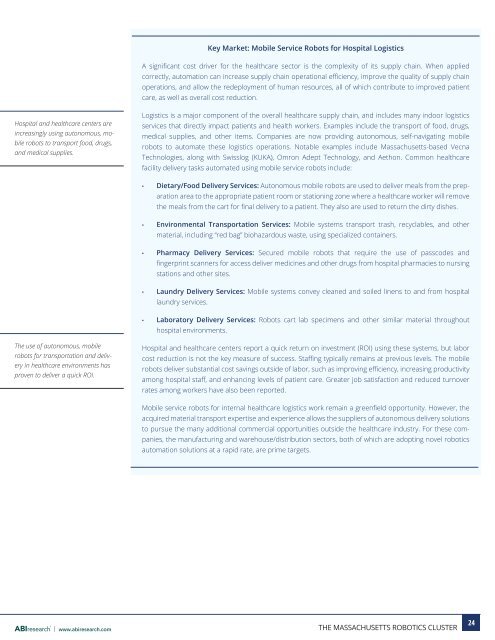ROBOTICS CLUSTER
Massachusetts%20Robotics%20Cluster%20Report%20Final
Massachusetts%20Robotics%20Cluster%20Report%20Final
Create successful ePaper yourself
Turn your PDF publications into a flip-book with our unique Google optimized e-Paper software.
Key Market: Mobile Service Robots for Hospital Logistics<br />
A significant cost driver for the healthcare sector is the complexity of its supply chain. When applied<br />
correctly, automation can increase supply chain operational efficiency, improve the quality of supply chain<br />
operations, and allow the redeployment of human resources, all of which contribute to improved patient<br />
care, as well as overall cost reduction.<br />
Hospital and healthcare centers are<br />
increasingly using autonomous, mobile<br />
robots to transport food, drugs,<br />
and medical supplies.<br />
Logistics is a major component of the overall healthcare supply chain, and includes many indoor logistics<br />
services that directly impact patients and health workers. Examples include the transport of food, drugs,<br />
medical supplies, and other items. Companies are now providing autonomous, self-navigating mobile<br />
robots to automate these logistics operations. Notable examples include Massachusetts-based Vecna<br />
Technologies, along with Swisslog (KUKA), Omron Adept Technology, and Aethon. Common healthcare<br />
facility delivery tasks automated using mobile service robots include:<br />
• Dietary/Food Delivery Services: Autonomous mobile robots are used to deliver meals from the preparation<br />
area to the appropriate patient room or stationing zone where a healthcare worker will remove<br />
the meals from the cart for final delivery to a patient. They also are used to return the dirty dishes.<br />
• Environmental Transportation Services: Mobile systems transport trash, recyclables, and other<br />
material, including “red bag” biohazardous waste, using specialized containers.<br />
• Pharmacy Delivery Services: Secured mobile robots that require the use of passcodes and<br />
fingerprint scanners for access deliver medicines and other drugs from hospital pharmacies to nursing<br />
stations and other sites.<br />
• Laundry Delivery Services: Mobile systems convey cleaned and soiled linens to and from hospital<br />
laundry services.<br />
• Laboratory Delivery Services: Robots cart lab specimens and other similar material throughout<br />
hospital environments.<br />
The use of autonomous, mobile<br />
robots for transportation and delivery<br />
in healthcare environments has<br />
proven to deliver a quick ROI.<br />
Hospital and healthcare centers report a quick return on investment (ROI) using these systems, but labor<br />
cost reduction is not the key measure of success. Staffing typically remains at previous levels. The mobile<br />
robots deliver substantial cost savings outside of labor, such as improving efficiency, increasing productivity<br />
among hospital staff, and enhancing levels of patient care. Greater job satisfaction and reduced turnover<br />
rates among workers have also been reported.<br />
Mobile service robots for internal healthcare logistics work remain a greenfield opportunity. However, the<br />
acquired material transport expertise and experience allows the suppliers of autonomous delivery solutions<br />
to pursue the many additional commercial opportunities outside the healthcare industry. For these companies,<br />
the manufacturing and warehouse/distribution sectors, both of which are adopting novel robotics<br />
automation solutions at a rapid rate, are prime targets.<br />
www.abiresearch.com<br />
THE MASSACHUSETTS <strong>ROBOTICS</strong> <strong>CLUSTER</strong><br />
24


